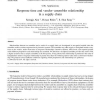Free Online Productivity Tools
i2Speak
i2Symbol
i2OCR
iTex2Img
iWeb2Print
iWeb2Shot
i2Type
iPdf2Split
iPdf2Merge
i2Bopomofo
i2Arabic
i2Style
i2Image
i2PDF
iLatex2Rtf
Sci2ools
EOR
2008
2008
Response time and vendor-assembler relationship in a supply chain
Relationships between an assembler and a vendor in a supply chain are investigated in two-period models when the assembler wants to reduce response time by incentive systems. The assembler may offer myopic or farsighted incentive contracts to the vendor, under short-term or long-term relationships. Incentive schemes, effort levels, and expected payoffs under different perspectives and relationships are examined. We find that a farsighted assembler provides the vendor with a higher incentive than a myopic assembler in the first period. A long (short)-term relationship is preferred if the value of farsightedness under a long-term relationship is greater (less) than the switching option value under a short-term relationship. We propose several sufficient conditions regarding which perspectives and relationships are preferred.
| Added | 10 Dec 2010 |
| Updated | 10 Dec 2010 |
| Type | Journal |
| Year | 2008 |
| Where | EOR |
| Authors | Seongje Ahn, Hosun Rhim, S. Hun Seog |
Comments (0)

